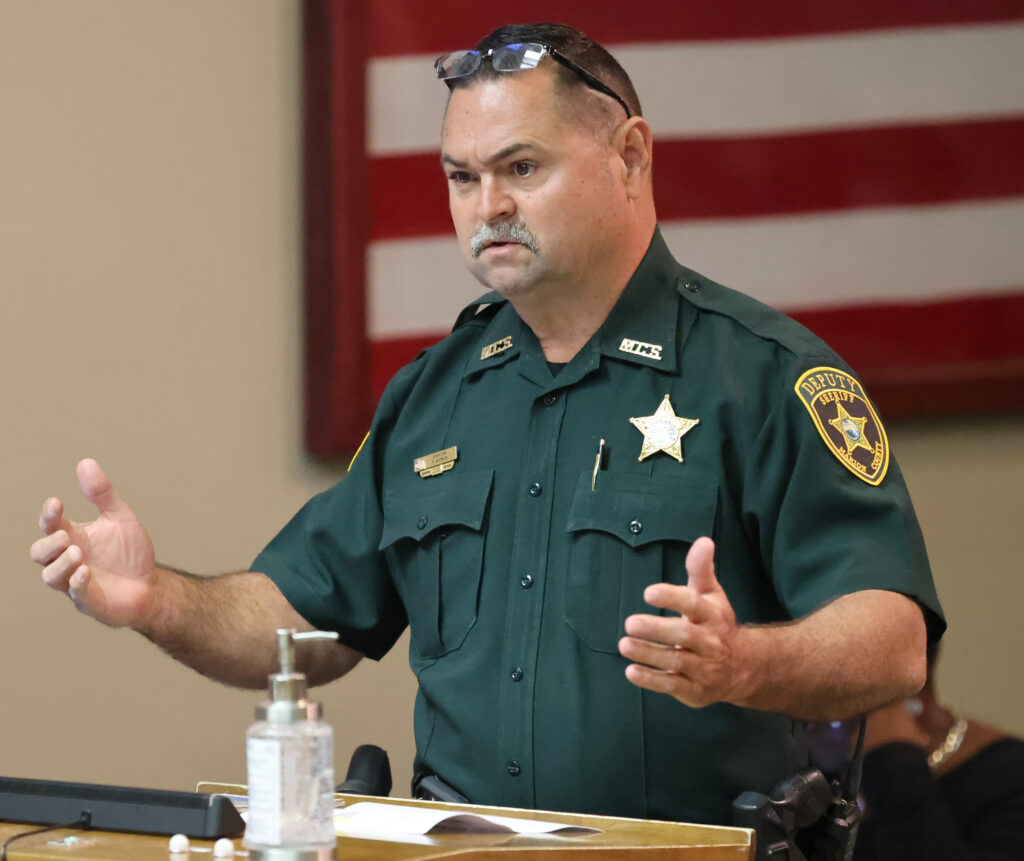Who is in charge in Ocala during an emergency?
The county’s response plan says it’s the mayor. Reality says otherwise.

File photo: Preston Bowlin, the director of Emergency Management for the Marion County Sheriff’s Office, speaks about COVID-19 during a Marion County Commission meeting in Ocala, Fla. on Tuesday, March 16, 2021. [Bruce Ackerman/Ocala Gazette] 2021.
Right up until the hours before making landfall in the Big Bend area of Florida last week, Hurricane Idalia was projected to pass over Marion County. That sobering possibility had many here wondering what would happen if a hurricane or other natural disaster struck the county.
Specifically, who would be in charge of the emergency response?
As part of an interlocal agreement established in 1988, the Marion County Sheriff’s Office (MCSO) heads emergency response. The agency’s Division of Emergency Management coordinates not only the response to an emergency such as a hurricane, but the preparation, recovery, education and awareness surrounding one.
As for the city of Ocala, the chain of command is less clear.
While the city follows the county’s lead in case of an emergency, according to city spokesperson Ashley Dobbs, the county’s response plan lists the mayor as being in charge of Ocala. In reality, City Manager Pete Lee takes command during an emergency, according to city officials.
After the “Gazette” brought this discrepancy to the attention of city officials, the city attorney recommended an update to the city code to reflect that the city manager should take point in an emergency.
“I would like to develop a draft ordinance that amends our code to provide specific delegation of emergency declaration and management authority to the city manager so that there is no question of that in the future,” said City Attorney William Sexton during his report at Tuesday’s city council meeting.
The discussion of a change in the city’s code regarding the chain of command during an emergency was not on the agenda or made known to the public before the meeting.
Ocala does not have an emergency management plan of its own, nor does it intend to create one, said City Council President Jim Hilty.
“I don’t know of any intention of creating a separate plan right now,” he said. “The system’s working well, in all the times that I’ve been involved with it.”
In an email, Dobbs explained that the city and county join forces as necessary.
“In the event of an emergency, the city and county work collaboratively to ensure that information is distributed in a quickly and timely manner,’’ she wrote. “(MCSO) switches over to the Emergency Operations Center during emergency events. Once the EOC is activated, we operate as one unit with the information coming through that agency.”
While the city is working to update its code, Marion County’s emergency plan, which was last revised in 2018, calls for county departments to each have their own response plan, according to county spokesperson Stacie Causey.
When the “Gazette” requested these documents, the county denied their release claiming that they were confidential under Florida Statutes 119.071(3)(a)1.c.
When the “Gazette” requested only the titles, subheadings, authors and approval dates of the plans with all other information redacted, the county again denied the release of that limited information.
The statute cited by the county exempts the government from releasing “records, information, photographs, audio and visual presentations, schematic diagrams, surveys, recommendations, or consultations or portions thereof relating directly to the physical security or fire safety of the facility or revealing security or fire safety systems; threat assessments conducted by any agency or any private entity; threat response plans; emergency evacuation plans; sheltering arrangements; or manuals for security or fire safety personnel, emergency equipment, or security or fire safety training.”
The “Gazette,” however, can find no exemption in the statute that prevents the county from sharing the date, page count, author, titles, or subtitles to their department plans.
Additionally, the state’s Sunshine Manual points to numerous cases that support the idea that “the Sunshine Law should be liberally construed to give effect to its public purpose, while exemptions should be narrowly construed.”
Read the Ocala Gazette Editorial Board’s opinion following this report.





